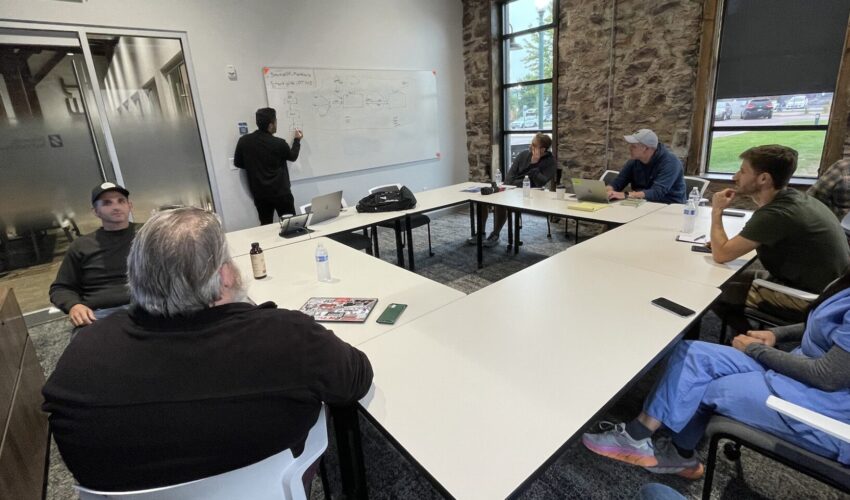In defense of a much-maligned role: The lobbyist
This piece is sponsored by Woods, Fuller, Shultz & Smith PC.
By Justin G. Smith, lobbyist and government relations attorney
For many Americans, the term “lobbyist” has a negative connotation. Popular sentiment could be summarized as follows: “Lobbyists are hired guns who use money and political connections to get better outcomes for the special interest groups they represent.” Some people envision shady characters in suits “wining and dining” senators in Washington, D.C., angling for special government favors.
In reality, lobbying is a basic component of American government. The First Amendment protects the right of every U.S. citizen “to petition the government for a redress of grievances.” Anytime you contact a legislator on a piece of legislation, you are essentially lobbying. More importantly, virtually every South Dakotan is represented by at least a few lobbyists at any given time. Every year in Pierre, lobbyists advocate on behalf of teachers, firefighters, retirees, police, physicians, lawyers, small businesses, retailers, nurses, farmers and countless other “special interest” groups. If you live and work in South Dakota, you are represented by lobbyists.
Lobbyist as educator
The work of a lobbyist boils down to two central missions: education and advocacy. The former of these is, on the whole, the most important work of a lobbyist. A South Dakota legislator must consider and vote on hundreds of pieces of legislation in a nine-week period. Many of these bills have far-reaching implications for one or more industry, business or organization. In addition, the bills cover a huge range of subject matters, such as insurance, health care, utilities and nonprofits. No single legislator is able to be an expert in everything, so where do they turn for information on the implications, costs and other critical issues raised by a bill?
Lobbyists represent the collective voices of many individual constituents, drawing on the aggregate knowledge of the full group. The lobbyist is then able to present a unified voice to legislators. Through this conversation, the legislator hears from an entire group or even an entire industry, getting the inside story from the people a bill will directly impact. The lobbyist presents the facts on the pros and cons of a vote on any bill. Lobbyists are subject-matter experts who accumulate institutional knowledge that is helpful to legislators in shaping good laws.
The lobbyist’s role as educator comes with an important burden – a lobbyist is only as effective as he is trustworthy. On the whole, the most successful lobbyists are those who present the most complete and accurate picture of the implications of any given bill, including presenting a fair picture of the other side of the arguments. Legislators make their own decisions when it comes time to vote, but they frequently depend on lobbyists to make that decision as informed as possible.
Lobbyist as advocate
Lobbyists are advocates for the constituents they represent. In many cases, a lobbyist is an employee of an organization or business that will be impacted by a given bill. Contract lobbyists are hired by one or more organizations to serve as their representative. Either type of lobbyist will educate legislators on the issues surrounding any bill and then work to accomplish their constituency’s desired outcome. Advocacy primarily involves testimony before legislative committees, one-on-one discussions with legislators and presentation of positive and negative implications of proposed laws.
One of the hallmarks of American lawmaking is compromise. When multiple constituencies conflict on a bill, there is often potential for an outcome that reasonably satisfies all parties. This compromise process is made easier if each stakeholder group is represented by a single voice. Without a lobbyist, it can be difficult to be involved in such discussions, given the burden of a having to gather, assess and respond to constantly evolving proposals. Lobbyists can, therefore, be conduits to legislative compromise, which typically results in better laws and overall public policy.
Lobbyist as resource
As a South Dakotan, you are capable of doing anything a lobbyist can do when it comes to legislative and government advocacy. With this in mind, why would you hire a lobbyist to represent your interests?
Lobbyists are experts in education, advocacy and communication They are also, by necessity, constantly monitoring legislation, politics and government issues at all levels. Perhaps more importantly, they have developed relationships with legislators and other officials over years of work. Those relationships are based on the lobbyist’s reputation as a trustworthy, informed representative of their clients. A lobbyist is, therefore, capable of educating legislators about your interests efficiently and effectively. Most businesses do not have the time to closely monitor the legislative process each year or review and study the implications of hundreds of bills You hire a lobbyist to fill this role, to review and monitor legislation and assess implications for your company’s business and other interests. Thereafter, the lobbyist is your advocate, working to obtain a positive outcome on any issues.
Across the political spectrum, South Dakota officials usually praise the work of lobbyists in the legislative and regulatory processes. Legislators are the ones who vote on bills, but they depend on lobbyists to educate and inform on the positions of countless constituencies across the state. Laws and regulations at the federal, state and local levels impact the private sector on a daily basis. Retaining a lobbyist is a small investment that can help your company have a voice in shaping public policy, resulting in better laws for all interested parties.
To learn more about lobbying as a resource for your business or organization, contact attorney Justin G. Smith at [email protected]. You can follow him on Twitter at @justingsmith.








